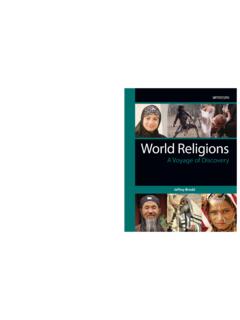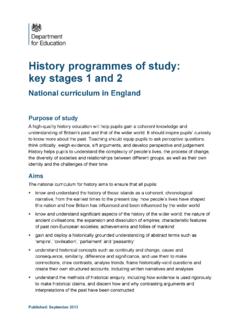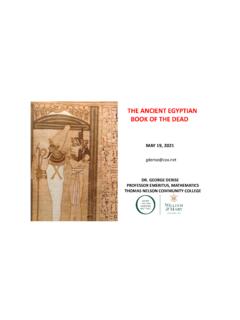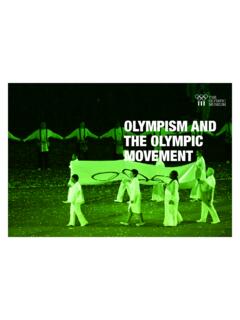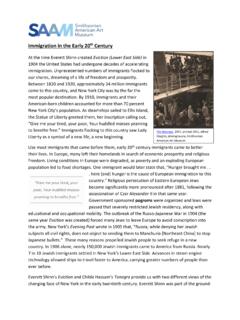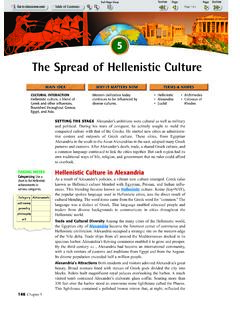Transcription of Carl Sagan - Cosmos - Internet Archive
1 Spacecraft missions to nearby Planets The Library of ancient Alexandria The human brain Egyptian Hieroglyphics The origin of life The death of the Sun The evolution of galaxies The origins of matter, suns and worlds Cosmos . The story of fifteen billion years of cosmic evolution transforming matter and life into consciousness, of how science and civilization grew up together, and of the forces and individuals who helped shape modern science. A story told with carl Sagan 's remarkable ability to make scientific ideas both comprehensible and exciting, based on his acclaimed television series.
2 For Ann Druyan In the vastness of space and the immensity of time, it is my joy to share a planet and an epoch with Annie carl Sagan was the Director of the Laboratory for Planetary studies and David Duncan Professor of Astronomy and Space Sciences at Cornell University. He played a leading role in the Mariner, Viking and Voyager expeditions to the planets, for which he received the NASA medals for Exceptional Scientific Achievement and for Distinguished Public Service, and the international astronautics prize, the Prix Galabert. He served as Chairman of the Division for Planetary Sciences of the American Astronomical Society, as Chairman of the Astronomy Section of the American Association for the Advancement of Science, and as President of the Planetology Section of the American Geophysical Union.
3 For twelve years, he was Editor-in-Chief of Icarus, the leading professional journal devoted to planetary research. In addition to four hundred published scientific and popular articles, Dr Sagan was the author, co-author or editor of more than a dozen books, including Intelligent Life in the Universe, The Cosmic Connection, The Dragons of Eden, Murmurs of Earth, Broca's Brain and the bestselling science fiction novel, Contact. He was a recipient of the Joseph Priestly Award for distinguished contributions to the welfare of mankind', and the Pulitzer Prize for literature.
4 carl Sagan died in December 1996. carl Sagan . Cosmos CONTENTS. Introduction 1 The Shores of the Cosmic Ocean 2 One Voice in the Cosmic Fugue 3 The Harmony of Worlds 4 Heaven and Hell 5 Blues for a Red Planet 6 Travelers' Tales 7 The Backbone of Night 8 Travels in Space and Time 9 The Lives of the Stars 10 The Edge of Forever 11 The Persistence of Memory 12 Encyclopaedia Galactica 13 Who Speaks for Earth? Appendix 1: Reductio ad Absurdum and the Square Root of Two Appendix 2: The Five Pythagorean Solids INTRODUCTION. The time will come when diligent research over long periods will bring to light things which now lie hidden.
5 A single lifetime, even though entirely devoted to the sky, would not be enough for the investigation of so vast a subject .. And so this knowledge will be unfolded only through long successive ages. There will come a time when our descendants will be amazed that we did not know things that are so plain to them .. Many discoveries are reserved for ages still to come, when memory of us will have been effaced. Our universe is a sorry little affair unless it has in it something for every age to investigate .. Nature does not reveal her mysteries once and for all.
6 - Seneca, Natural Questions, Book 7, first century In ancient times, in everyday speech and custom, the most mundane happenings were connected with the grandest cosmic events. A charming example is an incantation against the worm which the Assyrians of 1000 imagined to cause toothaches. It begins with the origin of the universe and ends with a cure for toothache: After Anu had created the heaven, And the heaven had created the earth, And the earth had created the rivers, And the rivers had created the canals, And the canals had created the morass, And the morass had created the worm, The worm went before Shamash, weeping, His tears flowing before Ea: What wilt thou give me for my food, What wilt thou give me for my drink?
7 '. I will give thee the dried fig And the apricot.'. What are these to me? The dried fig And the apricot! Lift me up, and among the teeth And the gums let me dwell! .. Because thou hast said this, O worm, May Ea smite thee with the might of His hand! (Incantation against toothache.). Its treatment: Second-grade beer .. and oil thou shalt mix together;. The incantation thou shalt recite three times thereon and shalt put the medicine upon the tooth. Our ancestors were eager to understand the world but had not quite stumbled upon the method. They imagined a small, quaint, tidy universe in which the dominant forces were gods like Anu, Ea, and Shamash.
8 In that universe humans played an important if not a central role. We were intimately bound up with the rest of nature. The treatment of toothache with second-rate beer was tied to the deepest cosmological mysteries. Today we have discovered a powerful and elegant way to understand the universe, a method called science; it has revealed to us a universe so ancient and so vast that human affairs seem at first sight to be of little consequence. We have grown distant from the Cosmos . It has seemed remote and irrelevant to everyday concerns. But science has found not only that the universe has a reeling and ecstatic grandeur, not only that it is accessible to human understanding, but also that we are, in a very real and profound sense, a part of that Cosmos , born from it, our fate deeply connected with it.
9 The most basic human events and the most trivial trace back to the universe and its origins. This book is devoted to the exploration of that cosmic perspective. In the summer and fall of 1976, as a member of the Viking Lander Imaging Flight Team, I was engaged, with a hundred of my scientific colleagues, in the exploration of the planet Mars. For the first time in human history we had landed two space vehicles on the surface of another world. The results, described more fully in Chapter 5, were spectacular, the historical significance of the mission utterly apparent.
10 And yet the general public was learning almost nothing of these great happenings. The press was largely inattentive;. television ignored the mission almost altogether. When it became clear that a definitive answer on whether there is life on Mars would not be forthcoming, interest dwindled still further. There was little tolerance for ambiguity. When we found the sky of Mars to be a kind of pinkish-yellow rather than the blue which had erroneously first been reported, the announcement was greeted by a chorus of good-natured boos from the assembled reporters - they wanted Mars to be, even in this respect, like the Earth.


